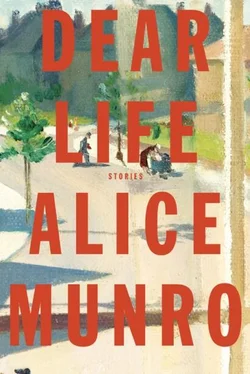Am I sure she said that—mouthwatering? Whatever she said, it did not sound quite right. I wished then for my father to be there, always sounding perfectly right for the occasion, even when he spoke grammatically. He would do that in our house but not so readily outside of it. He slipped into whatever exchange was going on—he understood that the thing to do was never to say anything special. My mother was just the opposite. With her everything was clear and ringing and served to call attention.
Now that was happening and I heard her laugh, delightedly, as if to make up for nobody’s talking to her. She was inquiring where we might put our coats.
It turned out that we could put them anywhere, but if we wanted, somebody said, we could lay them down on the bed upstairs. You got upstairs by a staircase shut in by walls, and there was no light, except at the top. My mother told me to go ahead, she would be up in a minute, and so I did.
A question here might be whether there could really have been a payment for attending that dance. My mother could have stayed behind to arrange it. On the other hand, would people have been asked to pay and still have brought all those refreshments? And were the refreshments really as lavish as I remember? With everybody so poor? But maybe they were already feeling not so poor, with the war jobs and money that soldiers sent home. If I was really ten, and I think I was, then those changes would have been going on for two years.
The staircase came up from the kitchen and also from the front room, joining together into one set of steps that led up to the bedrooms. After I had got rid of my coat and boots in the tidied-up front bedroom, I could still hear my mother’s voice ringing out in the kitchen. But I could also hear music coming from the front room, so I went down that way.
The room had been cleared of all furniture except the piano. Dark green cloth blinds, of the kind I thought particularly dreary, were pulled down over the windows. But there was no dreary sort of atmosphere in the room. Many people were dancing, decorously holding on to each other, shuffling or swaying in tight circles. A couple of girls still in school were dancing in a way that was just becoming popular, moving opposite each other and sometimes holding hands, sometimes not. They actually smiled a greeting when they saw me, and I melted with pleasure, as I was apt to do when any confident older girl paid any attention to me.
There was a woman in that room you couldn’t help noticing, one whose dress would certainly put my mother’s in the shade. She must have been quite a bit older than my mother—her hair was white, and worn in a smooth sophisticated arrangement of what were called marcelled waves, close to her scalp. She was a large person with noble shoulders and broad hips, and she was wearing a dress of golden-orange taffeta, cut with a rather low square neck and a skirt that just covered her knees. Her short sleeves held her arms tightly and the flesh on them was heavy and smooth and white, like lard.
This was a startling sight. I would not have thought it possible that somebody could look both old and polished, both heavy and graceful, bold as brass and yet mightily dignified. You could have called her brazen, and perhaps my mother later did—that was her sort of word. Someone better disposed might have said, stately. She didn’t really show off, except in the whole style and color of the dress. She and the man with her danced together in a respectful, rather absentminded style, like spouses.
I didn’t know her name. I had never seen her before. I didn’t know that she was notorious in our town, and maybe farther afield, for all I knew.
I think that if I was writing fiction instead of remembering something that happened, I would never have given her that dress. A kind of advertisement she didn’t need.
Of course, if I had lived in the town, instead of just going in and out every day for school, I might have known that she was a notable prostitute. I would surely have seen her sometime, though not in that orange dress. And I would not have used the word prostitute. Bad woman, more likely. I would have known that there was something disgusting and dangerous and exciting and bold about her, without knowing exactly what it was. If somebody had tried to tell me, I don’t think I would have believed them.
There were several people in town who looked unusual and maybe she would have seemed to me just another. There was the hunchbacked man who polished the doors of the town hall every day and as far as I know did nothing else. And the quite proper-looking woman who never stopped talking in a loud voice to herself, scolding people who were nowhere in sight.
I would have learned in time what her name was and eventually found out that she really did the things I could not believe she did. And that the man I saw dancing with her and whose name perhaps I never knew was the owner of the poolroom. One day when I was in high school a couple of girls dared me to go into the poolroom when we were walking past, and I did, and there he was, the same man. Though he was balder and heavier now, and wearing shabbier clothes. I don’t recall that he said anything to me, but he did not have to. I bolted back to my friends, who were not quite friends after all, and told them nothing.
When I saw the owner of the poolroom, the whole scene of the dance came back to me, the thumping piano and the fiddle music and the orange dress, which I would by then have called ridiculous, and my mother’s sudden appearance with her coat on that she had probably never taken off.
There she was, calling my name through the music in the tone I particularly disliked, the tone that seemed to specially remind me that it was thanks to her I was on this earth at all.
She said, “Where is your coat?” As if I had mislaid it somewhere.
“Upstairs.”
“Well go and get it.”
She would have seen it there if she herself had been upstairs at all. She must never have got past the kitchen, she must have been fussing around the food with her own coat unbuttoned but not removed, until she looked into the room where the dancing was taking place and knew who that orange dancer was.
“Don’t delay,” she said.
I didn’t intend to. I opened the door to the stairway and ran up the first steps and found that where the stairs took their turn some people were sitting, blocking my way. They didn’t see me coming—they were taken up, it seemed, with something serious. Not an argument, exactly, but an urgent sort of communication.
Two of these people were men. Young men in Air Force uniforms. One sitting on a step, one leaning forward on a lower step with a hand on his knee. There was a girl sitting on the step above them, and the man nearest to her was patting her leg in a comforting way. I thought she must have fallen on these narrow stairs and hurt herself, for she was crying.
Peggy. Her name was Peggy. “Peggy, Peggy,” the young men were saying, in their urgent and even tender voices.
She said something I couldn’t make out. She spoke in a childish voice. She was complaining, the way you complain about something that isn’t fair. You say over and over that something isn’t fair, but in a hopeless voice, as if you don’t expect the thing that isn’t fair to be righted. Mean is another word to be made use of in these circumstances. It’s so mean. Somebody has been so mean.
By listening to my mother’s talk to my father when we got home I found out something of what had happened, but I was not able to get it straight. Mrs. Hutchison had shown up at the dance, driven by the poolroom man, who was not known to me then as the poolroom man. I don’t know what name my mother called him by, but she was sadly dismayed by his behavior. News had got out about the dance and some boys from Port Albert—that is, from the Air Force base—had decided to put in an appearance as well. Of course that would have been all right. The Air Force boys were all right. It was Mrs. Hutchison who was the disgrace. And the girl.
Читать дальше












